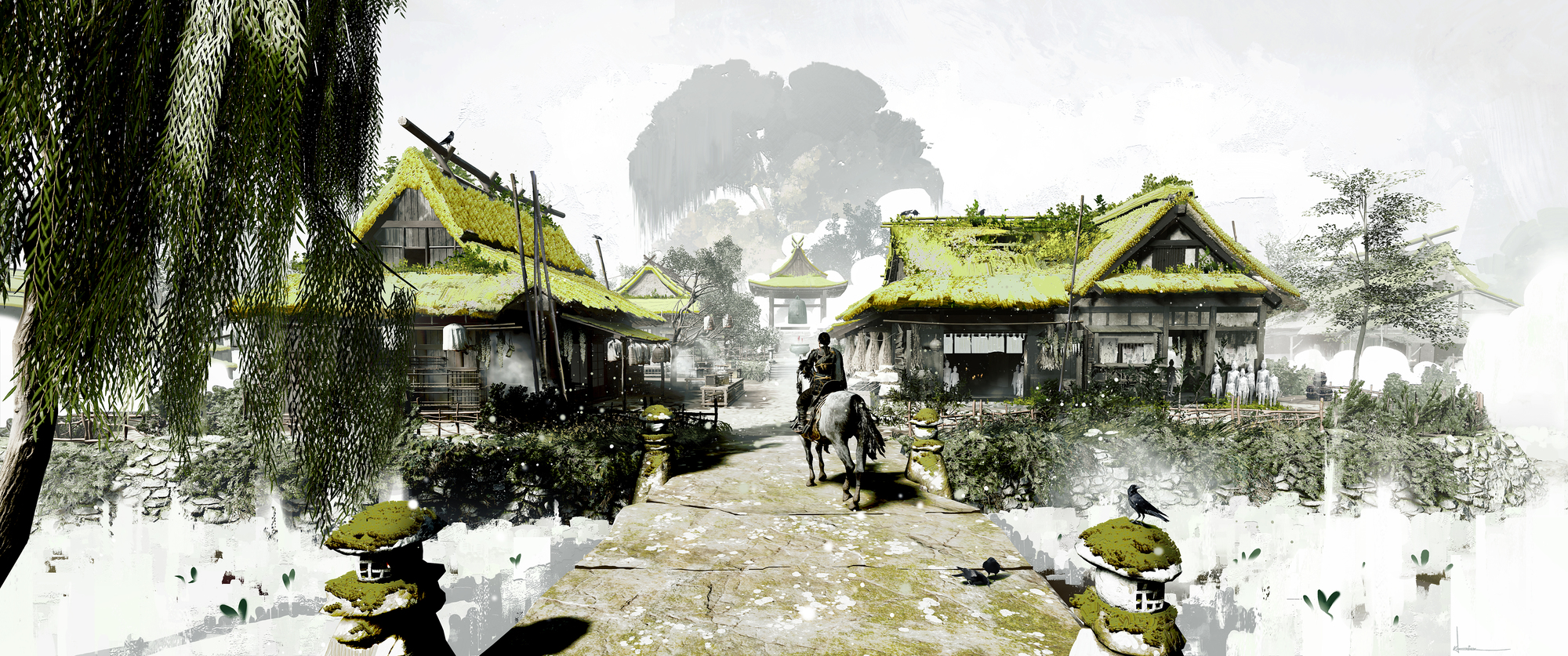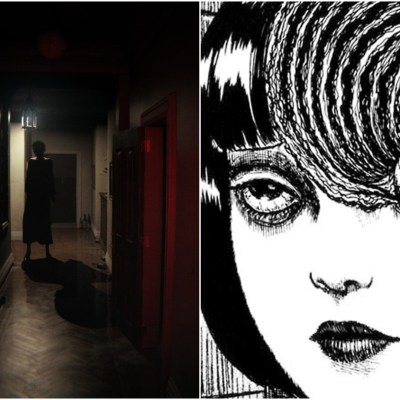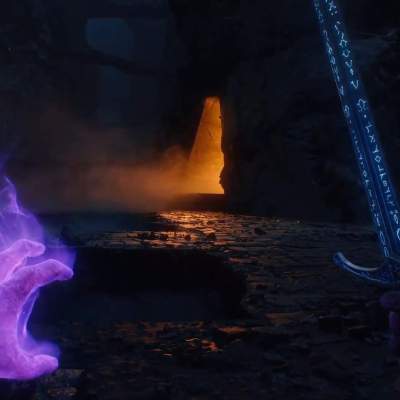Ilan Eshkeri is something of a musical adventurer. He’s an award-winning composer who has scored a wide variety of films including Layer Cake, Stardust, Kick-Ass, Shaun the Sheep Movie, has composed a modern ballet based on Echo & Narcissus, has conducted an orchestra at the Louvre, and has even worked with the European Space Agency (who sent him on a zero-G, parabolic flight). As an artist, he’s always looking to be challenged and inspired in new ways. And his latest project is unlike anything he’s ever done before.
“I’ve been saying, ‘Let me do a video game’ for like fifteen years,” Eshkeri tells Den of Geek over a Zoom call, explaining why he chose Sucker Punch’s Ghost of Tsushima as the next evolution in his career. He’d composed music for just one other game, The Sims 4 back in 2014, and when Sucker Punch approached him to compose music for the studio’s upcoming samurai epic, he felt it would be the perfect opportunity to jump back into the video game fold.
“When I pick projects, what I’m looking for is a good, emotional story that I can emotionally connect with. That, and do I connect with the other creative people on the project? If those two things work, then I want to do it,” explains Eshkeri of his decision to work with Sucker Punch. “The music team said, ‘We love this score that you did for this movie Coriolanus,’ which is an arthouse Shakespeare film that Ralph Fiennes directed. And I was like, ‘Okay, so you’re making this blockbuster video game, and you’re interested in this arthouse bit of work that I did.’”
Eshkeri worked closely with Sucker Punch on the score, which also features five suites by Japanese composer Shigeru Umebayashi, who is best known for his work with famed Hong Kong director Wong Kar-wai and his scores for wuxia films such as House of Flying Daggers.
“We sat down in a boardroom and they gave me this big talk through,” Eshkeri said. “It’s like this 45-minute long talk through visual bits of art and little bits of motion capture of some of the bits of the game that were in play. They told me the whole story [of Ghost of Tsushima] from beginning to end, and I was blown away. I was like, ‘This is better than most movies that I have read in a long time.’”
While Eshkeri had little experience composing for video games, he was quite comfortable telling emotional stories with his music, which is exactly what Sucker Punch needed him to do. Protagonist Jin Sakai’s journey centers on his inner struggle with the samurai’s idea of honor, which he was raised to uphold, and the deceptive “Ghost” war tactics he knows are necessary to protect his people from the invading Mongols. Eshkeri found ample inspiration in Jin’s story and found it artistically freeing.
“What really got me is that Jin is in crisis the whole time. He’s emotional. He’s having to go against everything he’s been taught, everything in his whole moral code, in order to save the people that he loves. That is a very intense and rich place to come into to explore any kind of emotion at all whatsoever. I thought, ‘I can write something really powerful from that place.’”
To prepare himself for the project, Eshkeri immersed himself in Japanese music, instruments, and culture, though he made sure to avoid one point of reference that might surprise those who have played through Ghost of Tsushima. The game features an optional “Kurosawa Mode,” which presents the visuals in black and white with added film grain effects as an homage to the incomparable Japanese auteur Akira Kurosawa. But Eshkeri’s musical contributions actually bear little resemblance to the music that accompanied Kurosawa’s films.
“I deliberately did not go down that road,” Eshkeri says of his approach to Ghost of Tsushima’s soundtrack. “I don’t really like film music references because what happens with these references is that you end up pastiching the sound of it because they’re so appropriate and they work so well. So I’d rather…if somebody says, ‘Well, I like the work of this person,’ I go, ‘Okay. Who was that person inspired by?’ That’s where I like to go. And so typically, if I’m writing a big Hollywood symphonic score, I’m looking up at [Gustav] Holst or at [Richard] Wagner, the great classical composers — the later ones — who started developing the sort of language and the sort of harmony that we hone film scores. I try to go back to that source.”
So, Eshkeri went way back, beyond Kurosawa, to find Japanese musical influence. Sucker Punch was looking for authenticity in the game’s music, and he was willing to go all the way, digging up the most authentic sounds and instruments he could find, no matter how obscure. He was unsure the team would be onboard with this level of “nerdiness,” as he calls it, despite their request for true authenticity.
“Sometimes people say that and then you get into it and they go, ‘No. No. Actually, we just want the thing that we were expecting, that everyone was expecting’” explains Eshkeri of his typical collaboration process. “But these guys, whatever crazy idea I threw at them, they were like, ‘That’s great. Let’s explore that. Let’s go down that road.’ And they were right there with me on the journey. So it was creatively very, very satisfying.”
Read more
Eshkeri was given license to go as deep as he wanted in his research, and indeed, he dove just about as deep as one could dive, looking into Japanese Shomyo Buddhist music, whose roots can be traced back as far back as 752AD.
“I got in touch with this professor of Japanese music, Professor David Hughes, who’s a great master of all of this stuff. He guided me towards great musicians. He guided me to what books to read. We talked at length so that I really developed an understanding of the pentatonic scales that are used in Japanese music or how they use them and why.”
Eshkeri continues, almost apologetically, “So this is incredibly nerdy. But just to give you one example. The pentatonic scale has got five notes in it, but [the monks] embellished the notes. So you get on the shakuhachi [type of Japanese flute] and you can go from just beneath the note or just above the note, depending on how you wrote it. So you have those variants. On the koto [Japanese string instrument], you can only bend upwards. So you could go just above the note, but you can never go below the notes, right? And so I started to learn all this stuff. And now I know just enough, the tip of the iceberg, just to know that I don’t know very much at all.”
This level of research and immersion paid off. Ghost of Tsushima’s soundtrack is ravishing, replete with arrangements of ancient instruments that sound true to the time period but move and undulate in a way that’s dynamic and distinctly modern. Shomyo music is restrictive in certain respects, mostly due to the fact that the instruments traditionally used to play it are limited to one key, so Eshkeri wasn’t able to use evocative key changes and swells in his compositions as frequently as he would in, say, a traditional movie score. “That was a challenge in itself,” Eshkeri explains. “Because key changes, that’s what we often use as this sort of ear candy, right?” But when the game calls for it, Eshkeri’s score does occasionally transcend the traditional Shomyo sound.
“In places, of course, I broke the rules,” Eshkeri says. “I needed to write harmonies, right? And there isn’t really much harmony in Shomyo music. It’s more just [melody] lines. And so I created chords out of the notes scale, and I created a whole sort of way of writing music for the game that was completely based on the main two or three Japanese pentatonic scales, using the instruments, learning to write appropriately for the instruments as much as possible…and then I broke the rules. I researched and then I just created my own world.”
For Eshkeri, the most difficult piece of music to write for the game accompanies [spoiler alert] the final duel between Jin and his uncle, Lord Shimura. “I needed to write something that has all the action beats to it,” Eshkeri explains. “But at the same time, I want the player to have tears in their eyes while having this fight. How do you do those two things at the same time? That was the hardest piece to write. There is a huge key change at one particular moment that hopefully has great effect. I haven’t played that bit in the game myself, so I have to play to see. But I think it’s about finding your own path and becoming the kind of person that you need to be.”
The generational conflict between Jin and Lord Shimura — between progress and tradition – -is timeless and rings true even in today’s sociopolitical climate. Eshkeri composed the game’s music to reflect the generational theme throughout.
“That’s why I was trying to be so traditional in my approach to the music and then break the rules where I could,” Eshkeri explains. “I think it’s a timeless thing. It’s Shakespearean in the way that it connects to your heart because what’s great about Shakespeare and the great writers that we keep going back to is that they’re always relevant. Whatever’s happening in the world, there’s something relevant and something the way the story informs things in ways that they couldn’t have imagined when they were writing it, but it’s because we’re just repeating stuff. And every generation has their own revolution, right? And I guess that’s what this game is looking at. Yeah, that’s just powerful stuff really. For me, it’s sort of about the future and the past.”
Ghost of Tsushima is out now for the PlayStation 4.


